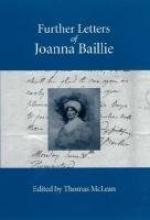|
This section contains 6,978 words (approx. 24 pages at 300 words per page) |

|
SOURCE: Brigham, Linda. “Aristocratic Monstrosity and Sublime Femininity in De Monfort.” Studies in English Literature, 1500-1900 43, no. 3 (summer 2003): 701-18.
In the following essay, Brigham contrasts the views of Baillie and Edmund Burke on the subject of “the passions,” focusing on how De Monfort criticizes Burke's notions of the unreflective immediacy of the passionate response to beauty.
“The theatre is a school in which much good or evil may be learned,” writes Joanna Baillie in the “Introductory Discourse” to the first volume of her Series of Plays.1 To tilt the balance toward the side of good, Baillie intends to transform the theater into a laboratory for the dissection of the strong passions. Such a project, she claims, makes good use of natural affinities. An individual possessed by strong passion naturally and universally attracts an intense “sympathetick curiosity,” even when “no outward circumstance connected with him either awakens our attention...
|
This section contains 6,978 words (approx. 24 pages at 300 words per page) |

|


